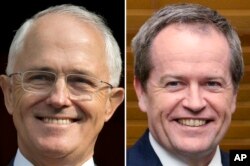Australians are gearing up to hit the polls in a close federal election Saturday where the country will decide whether minor parties will overthrow the incumbent government.
While climate change, immigration and education are key issues, it is the economy that is likely to decide who wins. Australia has avoided recession for 25 years, but the future is unclear as a resources boom fueled by China’s appetite for iron ore and coal continues to fade.
In Sydney, cranes dominate the skyline as a swathe of new apartment blocks emerge alongside upgraded transport links. As a long mining boom comes to an end, Australia is banking on a reinvigorated construction industry, along with manufacturing, tourism and agriculture.
But Britain’s decision to leave the European Union has created great anxiety here, and Australian political leaders have put economic security at the heart of their election campaigns.
Prime Minister Malcolm Turnbull has told voters the country needs the stability his center-right coalition government can provide.
But the opposition Labor leader, Bill Shorten, says the prime minister is a weak leader, just like his besieged British counterpart.
“Mr. Turnbull just says because there has been an upset you should vote for him," Shorten said. "The problem is the nature of the upset we have seen arises out of weak leadership and a divided government. David Cameron never wanted to have this referendum. What we saw there is David Cameron hostage to the right wing of his political party, compromising his own beliefs, providing weak leadership. Sounds familiar, doesn’t it?"
This election has been shaken by a number of minor parties, including a candidate from the Greens and other independent parties named after their candidates. But all of them must convince voters they have the safe hands the economy needs.
The economy is almost always a top priority for Australian voters, according to Professor Rodney Smith from the department of government and international relations at the University of Sydney.
“Although Australia is a wealthy country, it is also a country that relies very heavily its resources," he told VOA. "Its natural resources, resource extraction - exporting minerals, exporting its agricultural produce, so in a changing world economy that is always rather fragile base on which to go forward as an economy."
Voting in Australia is compulsory, so turnout will be high, and so are the stakes. But Australia's scattered population across the vast country has called for special missions to help voters. Forty-six Australians cast their votes from an Australian research center in Antarctica, according to the Australian Electoral Commission.
Forty-one mobile teams have also been sent to remote areas of the country to ensure residents are able to vote - including a small cattle station town of 130 voters some 300 kilometers from the nearest city.
Opinion polls have both major parties neck-and-neck as campaigning continues in the final day ahead of Australia’s federal election.





